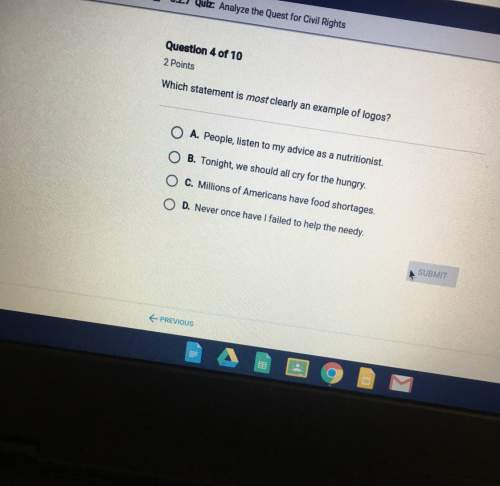
English, 13.01.2020 08:31 mateotrevino1
For the sake of rhetorical flourish, the author wants to use the same word as two different parts
of speech. which choice best accomplishes this goal?
she did not hate many things, although she disliked the very act of hating things.
no change
although she hated that emotion.
except for that very emotion.
d
except for hate itself.

Answers: 1


Another question on English

English, 21.06.2019 18:40
Nutrients are chemical substances that are absorbed by the body through the process question@ask for
Answers: 1

English, 21.06.2019 19:00
The unblocking of popular social media websites in myanmar is an indication that.
Answers: 1

English, 22.06.2019 00:30
Pls due today which excerpt from the text most effectively demonstrates that the narrator's point of view about the cabuliwallah has changed? "i felt a little sorry, and would have called him back, but i found he was returning of his own accord." "i sent for mini immediately from the inner apartment. many difficulties were raised, but i would not listen." "tears came to my eyes. i forgot that he was a poor cabuli fruit-seller, while i was—. but no, what was i more than he? he also was a father." "i took them and was going to pay him, but he caught my hand and said: "you are very kind, sir! keep me in your recollection. do not offer me money! —"
Answers: 2

English, 22.06.2019 02:40
Returning from vietnam, we were indeed given a parade. crowds of screaming people waving signs — not just on one road, one day. no, they were everywhere. every day. on the streets, on the television, on the radio. a hot, angry tangle of shaking fists and ugly words that threatened us like a monster with a hundred heads. our country had chewed us up and spit us out, and now we were being treated as if it were our fault. what is one way the author's use of language contributes to the tone of this passage? a. the use of figurative language creates a feeling of resentment. b. the phrase "hot, angry tangle" is used sarcastically to create irony. c. the word "parade" is used sarcastically to create a lighthearted mood. d. the parallelism draws attention to the confusion of those returning.
Answers: 3
You know the right answer?
For the sake of rhetorical flourish, the author wants to use the same word as two different parts
Questions

History, 05.02.2021 06:00

Mathematics, 05.02.2021 06:00







Mathematics, 05.02.2021 06:00

Mathematics, 05.02.2021 06:00

Mathematics, 05.02.2021 06:00

Mathematics, 05.02.2021 06:00



Mathematics, 05.02.2021 06:00

Biology, 05.02.2021 06:00

Mathematics, 05.02.2021 06:00

Social Studies, 05.02.2021 06:00

Chemistry, 05.02.2021 06:00




